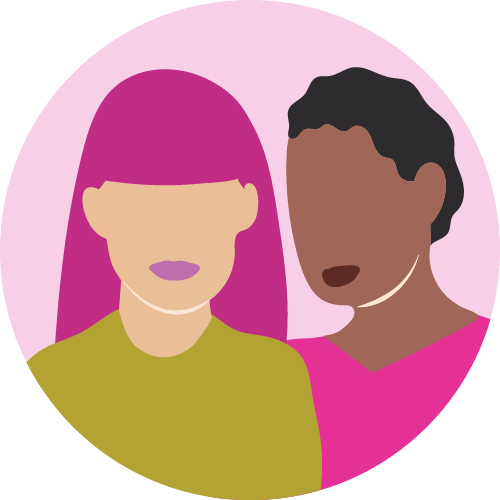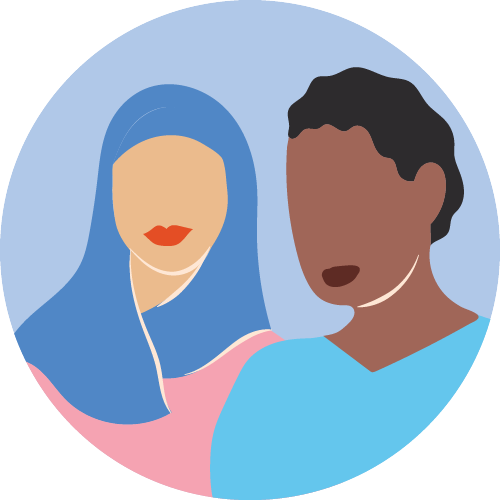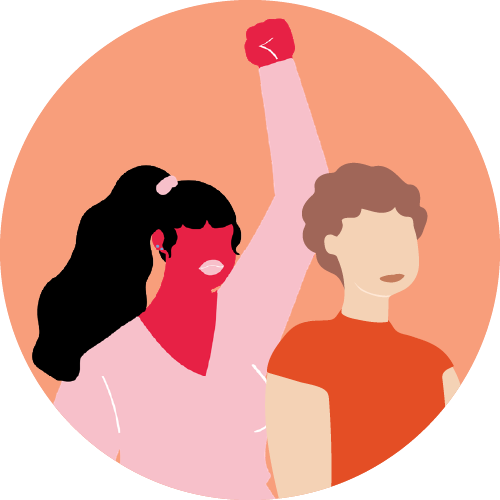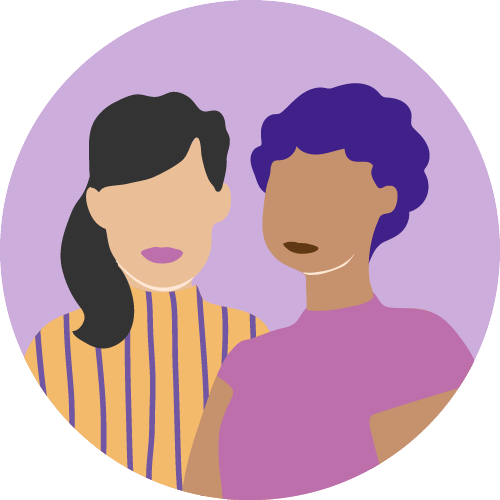This theme reveals the point in a friend’s relationship that would prompt young people to intervene. Some young people mentioned that they would do if they witnessed obviously harmful behaviours e.g., name-calling, offensive comments this would also be a sign of their friend needing help.
Theme 7 - Time to step in

Survey of 641 young people aged 13-24 across England and Wales - August 2021
9 in 10
Of the young people that had seen, or had a friend talk to them about worrying behaviours, 9 in 10 had talked to their friend to try to help them with a toxic or unhealthy relationship
Stepping in earlier...
One young person noted that they wouldn’t go to the trouble of stepping in if the person was experiencing gaslighting as, “it’s so strong they don’t even realise it” (Young person, 17-19). This highlights the need for awareness of the psychological impact to young people of non-physical abuses and advice needed to support friends. As one young person commented:
“I feel like the things that would probably make us all probably step in it's probably too late by then. Like if she was hit or... it's probably a bit late by then because she's already had all of this going on. All the trauma to begin with”
Young person, 20-24
“I feel like the things that would probably make us all probably step in it's probably too late by then. Like if she was hit or... it's probably a bit late by then because she's already had all of this going on. All the trauma to begin with”
Young person, 20-24
Not realising it's important...
Some young people showed awareness of intervening safely to help or getting their friend help if their phone or social media was being monitored. Others noted young people of their generation might not seek help as they minimise these types of problems.
"Yes, I feel like there’s a step in our generation maybe of downsizing your problems a bit. So, being in a situation like this, or a situation where you have problems and going, ‘Well I can’t really speak to somebody professional, because my problems aren’t big enough."
Young person, 20-24
"Yes, I feel like there’s a step in our generation maybe of downsizing your problems a bit. So, being in a situation like this, or a situation where you have problems and going, ‘Well I can’t really speak to somebody professional, because my problems aren’t big enough."
Young person, 20-24
When is the time to step in?
79% said the threat of physical violence or 92% said actual physical violence would be the time to step in and seek professional support. Of course, this may mean that intervention is happening too late.
"Definitely when it gets physical. So, when Georgie's threatening to hit her. Like, that’s definitely where the line completely ends" - Young person, 13-16
"Definitely when it gets physical. So, when Georgie's threatening to hit her. Like, that’s definitely where the line completely ends" - Young person, 13-16
Survey of 641 young people aged 13-24 across England and Wales - August 2021
79% / 92%
The threat of physical (79%) or actual physical harm (92%) would be when young people say they would definitely seek professional support
How would you help a friend
going through this?
going through this?
These are all real stories as told to us by young people
- - Trigger warning - please be aware these stories are hard to read. - -
- - Trigger warning - please be aware these stories are hard to read. - -
I asked my friend if she was ok in her relationship, it seemed like something was wrong in her body language but she said she was ok. She told me that her boyfriend said he didn't like her talking to anyone else about her relationship, because it made him insecure. She didn't feel free to talk to her friends about how she felt.
My friend is really caring and one of the people she was living with was having some mental health problems... she was being kind to him and helping. They were friends and then started sleeping together... He could get into these moods where she said he would become like someone else and would want to hurt himself... she became his sole support. She didn’t feel attracted to him anymore, but once he made moves and she said she wasn’t into it, he said “Well then go, and I’ll be here, on my own...“.
I kept being her listening ear and let her know that what was going on was not okay, and that her roommate should seek help... She felt so guilty for not taking better care of him and I, gently but firmly, said I understood where she was coming from, but this was not her responsibility. We would keep talking about this over a few months. I told her that she had been psychologically abused and that I thought he had raped her when he implied he would hurt himself if she didn’t sleep with him.
I kept being her listening ear and let her know that what was going on was not okay, and that her roommate should seek help... She felt so guilty for not taking better care of him and I, gently but firmly, said I understood where she was coming from, but this was not her responsibility. We would keep talking about this over a few months. I told her that she had been psychologically abused and that I thought he had raped her when he implied he would hurt himself if she didn’t sleep with him.
When I was a teenager, my best friend started being being paid for sex by her boss. She was only 14 or 15 at the time and he was in his late 50s. We didn't really know what to do at the time and she was very confident and jokey about it. We didn't understand grooming as an idea. We didn't think to report it to the school as they had handled a previous safeguarding issue with this friend really badly... he hid her from his wife. He was paying her hundreds of pounds...
He distributes controlling behaviour... he limits her from being able to see her friends. She's also told me that he can be very aggressive and shout and throw things, though she's never told me he's sexually violent or physically violent.
While I have always told her that I'm here for her if she ever needs it, and while I have often expressed concern for her wellbeing, I have avoided criticising him or giving her any kind of ultimatum as I don't want this to lead to her being alienated or not having friends to go to.
...I am now very frustrated that the school didn't notice the signs of her being groomed (more money, missing school, acting out, overly sexual language and behaviour) when she had previously been very academic and 'well behaved'. I wish we had the understanding of grooming at the time, when we could have got parents or the police involved. Now it is too late as she is an adult.
He distributes controlling behaviour... he limits her from being able to see her friends. She's also told me that he can be very aggressive and shout and throw things, though she's never told me he's sexually violent or physically violent.
While I have always told her that I'm here for her if she ever needs it, and while I have often expressed concern for her wellbeing, I have avoided criticising him or giving her any kind of ultimatum as I don't want this to lead to her being alienated or not having friends to go to.
...I am now very frustrated that the school didn't notice the signs of her being groomed (more money, missing school, acting out, overly sexual language and behaviour) when she had previously been very academic and 'well behaved'. I wish we had the understanding of grooming at the time, when we could have got parents or the police involved. Now it is too late as she is an adult.
My friend is really caring and one of the people she was living with was having some mental health problems... she was being kind to him and helping. They were friends and then started sleeping together... He could get into these moods where she said he would become like someone else and would want to hurt himself... she became his sole support. She didn't feel attracted to him anymore, but once he made moves and she said she wasn't into it, he said "Well then go, and I'll be here, on my own...".
I kept being her listening ear and let her know that what was going on was not okay, and that her roommate should seek help... She felt so guilty for not taking better care of him and I, gently but firmly, said I understood where she was coming from, but this was not her responsibility. We would keep talking about this over a few months. I told her that she had been psychologically abused and that I thought he had raped her when he implied he would hurt himself if she didn't sleep with him.
I kept being her listening ear and let her know that what was going on was not okay, and that her roommate should seek help... She felt so guilty for not taking better care of him and I, gently but firmly, said I understood where she was coming from, but this was not her responsibility. We would keep talking about this over a few months. I told her that she had been psychologically abused and that I thought he had raped her when he implied he would hurt himself if she didn't sleep with him.
I think people see young people as naive and stupid, but I’m fully aware of what people like that can do. It always starts small and with resources maybe people can learn what to look out for.... Gaslighting and manipulation turns life into hell and I wouldn’t want any young people to experience, especially in a place of education.
Survey of 641 young people aged 13-24 across England and Wales - August 2021
Said they would 'often' or 'very often' talk to their friend at school
Of young people would 'often' or 'very often' talk to their friends face to face about toxic relationships
Said they would 'often' or 'very often' talk to their friend at college/university
Would 'often' or 'very often' talk to their friend via a messaging app
Said they would 'often' or 'very often' talk to their friend via social media
Of non-binary young people would 'often' or 'very often' talk via social media or 61% via a messaging app.
68%

46%

44%

45%

42%

63%

Things to think about
These are just some of the many questions that might prompt answers:
- How might we help friends to know that what seems 'normal', isn't?
- How might we inspire friends to see red flags and step in sooner?
- How might we find ways for friends have conversations that inspire their friends to open up sooner?
- How might we help friends know what to say to those ask for help on behalf of their friend?
- How might we help the friend look after their own mental health whilst helping?
How might we...?

64%
Would definitely seek professional support if a friend was saying they were scared
Survey of 641 young people aged 13-24 across England and Wales - August 2021
54%
Would definitely seek professional support if a friend’s mental health was suffering
What are we doing about this?
We're currently working with young people in England and Wales to explore these insights so that we can co-produce resources to tackle the problem. We'll then need your help to get them out into places where young people spend time, both offline and online.
As we learn and create, we'll keep updating this page so please do come back to see more.
If you want to get in touch to help with this theme please contact yourbestfriend@safelives.org.uk
#WhatWillWork #YourBestFriend
As we learn and create, we'll keep updating this page so please do come back to see more.
If you want to get in touch to help with this theme please contact yourbestfriend@safelives.org.uk
#WhatWillWork #YourBestFriend
Explore other themes











